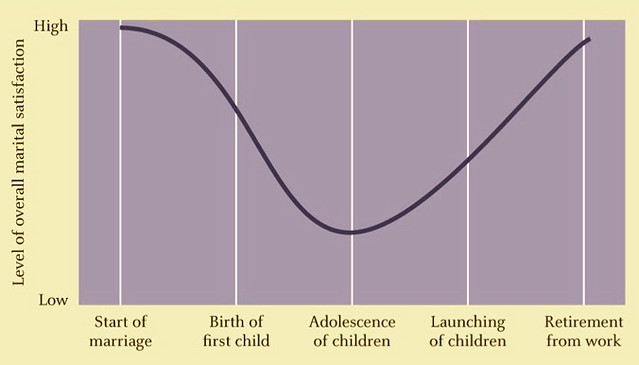To be honest, I'm too much of a feminist to deliver this lesson straight up the way it's supposed to be. So, this was one of those lessons where I pushed the envelope just a little bit.
Introduction
I started my lesson with a heavy disclaimer. I put a placard that said "The Ideal" up at the top of the chalkboard and then a placard that said "The Real" toward the bottom of the chalkboard. I talked about how there is a big gap there. And the topic of today's lesson tends to make that contrast feel very strong. Because today we're talking about The Family: A Proclamation to the World. (I then put the Proclamation up next to "The Ideal.") The Proclamation is a very idealistic thing. And, as such, it doesn't always correspond with our realities. I then put up a picture of a stressed-out mom next to "The Real."
Our lives aren't perfect. Sometimes our relationships with our spouses or our children are difficult or frustrating. Sometimes we aren't able to get married or have a family. Sometimes we lose our spouse to death or divorce. Sometimes the people we love make choices we disagree with.
It's hard not to see that as a personal failure. It's hard not to get depressed and feel like something's wrong with us because we're not perfect and we feel like we fall so short of the ideal. But I don't think that's how God sees us nor is it how he wants us to see ourselves. I think the important thing to remember is we talk about ideals in church to help us strive to be better, to make continuous daily improvements. But we don't need to think of ourselves as broken or as second-class citizens when we aren't perfect. Because every family, no matter how perfect they look on the outside, has problems, challenges, and things they struggle with. No one is exempt. And we would all do well to have a little charity for ourselves and for others as we muddle through this thing called life together.
The Effect of Children on Marriage
Next, I read several sections from the manual. It was the usual blah blah blah, the father presides and the mother nurtures the children. Yadda yadda yadda.
I told them that this stuff is nothing new. Both of those sections quoted heavily from the Proclamation, which we're all very familiar with by now. So, that's the Ideal. What about the Real?
I drew this graph on the board:
Ever since it was first identified in the 80s, this trend has been documented by multiple studies across multiple disciplines. The research is pretty clear that kids seem to make your marriage less happy. I rehearsed a few theories about why this could be (kids monopolize your money, create more housework, cause boredom, etc.).
Robert Miller, a BYU professor, likes to show this graph to his students and engage them in a discussion about it. Inevitably, one of his sassier students will ask: why have children at all? So I pose that same question to you: why have children at all? (Build on sister's responses.)
Planning a Family
What does the Proclamation say that can help you make this transition go a little more smoothly? (Here we read a section from the Proclamation that says families should plan to have children and make them a priority.) A landmark 10 year study done at the University of California at Berkeley that studied several aspects of marital happiness found that “couples who were ambivalent about parenthood, [who] disagreed about it, or who just ‘let it happen’ were far more likely to be unhappy and were at higher risk for divorce. Couples who planned a baby’s arrival or who were equally joyous at becoming parents were far more likely to maintain their marital happiness or even enjoy an increase after the baby was born" (from Tara-Parker Pope's For Better). So, if you plan for a family like the Proclamation says to, it will help make that transition go better.
Sharing the Load in Parenting
Now let’s read from my absolute most favorite part of the Proclamation. This part is super, super awesome. Right after the section where it talks about how fathers should preside and provide for their families and then it says mother should nurture their children, the next line of the Proclamation reads: “In these sacred responsibilities, fathers and mothers are obligated to help one another as equal partners.”
Even though fathers have the stewardship over providing for their family and mothers’ stewardship is over the children, I think what this phrase is trying to suggest is that we don’t need to be so dogmatic in saying: “This is your job and this is my job and we CANNOT mix the two.” We help each other in our stewardships.
Take, for example, the role of parenting. Even though the mother is responsible to nurture the children, that doesn’t mean the father should have no involvement with the children whatsoever. That would be ludicrous. Academic research has shown again and again that a father who is closely involved in the lives of his children has a dramatic impact on their health and well-being. (I then read several statistics that I took about the importance of having an involved father in the home from the US Dept of Health and Human Services.)
Now here’s something that’s extra fascinating: the California Department of Social Services Office of Child Abuse Prevention funded a major study targeted at figuring out how to get fathers more involved in parenting. Without going into too many details, the study found that fathers had less parenting stress and marital happiness when they had support from their wives. Again, from Tara Parker-Pope:
How have you found the balance described in the Family: the Proclamation to the World in your own family or how have you seen it working in other families that you might be familiar with? How have you found a way to be equal partners in fulfilling your divine responsibilities? (Build on sister's responses.)
Now you’re probably thinking, of course his wife supports his effort to help more around the house. But studies show that’s not always the case. A difficult lesson many mothers have to learn is that they are bringing some of the parenting stress upon themselves by not ceding control from time to time. Women often complain that fathers don’t help enough, but when they do help, wives often unwittingly sideline their husbands, unintentionally discouraging them by micromanaging the way they wash the baby or change the diaper. …
How many mothers have berated their husbands when they’ve come home and discovered him playing video games with the kids? It’s not that video games are banned—the game console is in the house, after all. But maybe the mom would rather see her kids reading or playing outside. Is it really fair to criticize her husband’s parenting style just because it’s different from her own?
Studies show that the best predictor of a father’s involvement with his children is not the way he feels about his kids. The best predictor of a man’s parenting is his relationship with his wife. When the mother relinquishes her power and lets a father parent his own way, video games and all, he tends to be happier with the mother and more involved with his children.
Sharing the Load in Housework
Now, aside from saying that husbands and wives should be equal partners, the Proclamation is virtually silent on the issue of housework. I then cite statistics that say that women clearly do the majority of housework in the home---regardless of whether she is a stay-at-home mom, whether both she and her husband work, or even when the husband is the one who stays home. Since the perceived division of labor over housework is often a source of conflict in marriage, I provided the sisters with a chores worksheet that would stimulate a discussion about how fairly their chores are divided. I said they could possibly use it as a discussion to talk about fairness. For me, it helped me to realize just how much my husband really does help out that I don't necessarily give him credit for.
Conclusion
I then concluded by citing statistics showing how a happy marriage can be beneficial to your health in the long run.


No comments:
Post a Comment